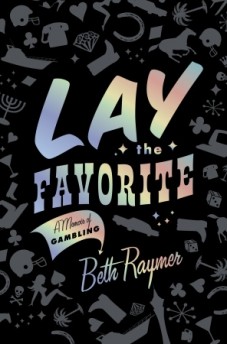 Reviewed:
Reviewed:
Lay the Favorite by Beth Raymer
Spiegel & Grau, 240 pp., $25.00
Colorful gamblers are often called Runyonesque, but it might be more accurate to reverse the formula and say that Damon Runyon simply wrote with a clear eye about characters who were gambleresque. Devoting your life to the odds requires more than a little oddity, and plenty of hardcore gamblers are just as cartoonish as the people in Runyon’s pages. Beth Raymer knows this well, having spent several years working for high-powered (if not high-functioning) bettors and bookies in Las Vegas, New York, and Costa Rica. Lay the Favorite tells the story of her initiation and immersion.
Raymer followed a boyfriend to Vegas in 2001, but broke up with him soon after. Using some combination of survival instinct and a future memoirist’s nose for a good story, she went to work for Dink (Douglas Heimowitz), a professional gambler. Dink wears ill-fitting casino-branded T-shirts and sport jackets (meaning windbreakers with team logos on them), and listens to the Ramones, Gram Parsons, and the Old 97’s. Like so many gamblers who deal in serious amounts of money, Dink has a hard time taking money seriously enough, rehiring someone who once stole $75,000 from him and generally treating legal tender like it’s a much lower grade of paper product. “[E]ven with Dink in the room,” Raymer recalls, “swiping ten grand in casino chips off his desk was as easy as sweeping breadcrumbs into the palm of your hand.” Dink’s in bad health. (“My body’s rejecting me,” he says. “The parasites have disrupted things and now I’m turning green.”) And, surprise, he’s not good around the house. (“I make the money,” he tells his wife Tulip, hardly a domestic goddess herself, “you change the light bulbs.”)
Then there’s Bernard, approaching 400 pounds, who Dink later recommends to Raymer when she’s looking for a job in New York and can’t kick the world of high stakes. In case you’re worried that Bernard’s eccentricities will pale next to Dink’s, he employs “sweaters,” who are paid eight bucks an hour (plus benefits) to “sit in silence, stare at yahoosports.com, and telepathically root for the [team we] need.”
Dink, Bernard, and, to a lesser degree, Tulip, are the book’s central figures, but Raymer also mentions in passing a bevy of other characters, whose own books we’re left to imagine for ourselves: Bobby the Owl, Fat George, Magic Epstein, Dave the Rave, Joey Useless. About this fringe world of the thoroughly nicknamed, Raymer develops a strong understanding:
They had watched each other go to prison for tax evasion, bookmaking, and race fixing. They’d seen each other flush at the final table at the World Series of Poker and so broke that they couldn’t pay their electric bill. Through the years, they had bet each other thousands of dollars on things as meaningless as whether or not the winner of the spelling bee would be wearing glasses and as consequential as the results of their prostate exams.
Raymer is funny and, when she wants, she can conjure atmosphere with efficiently poetic strokes. But while Lay the Favorite is a romp, Raymer is the weak cast member at its center. When writing about herself, and especially her romantic feelings (her relationships occasionally pop up to give the book an unconvincing emotional through line), she can come across as simplistic, even schoolgirlish, as in these excerpts about three different men:
His lips were full and his teeth crooked in the most perfect way. . . . Who cared if Yitzhak was robbing the casino? I liked being close to him.
I loved the way the soap smelled on his skin and trying to make him laugh made me deliriously happy.
[T]o be honest, his positive qualities weren’t what held my interest. What drove me absolutely crazy with determination was his extreme criticalness and aloofness. I never seemed to please Jeremy and it was hard to make him laugh.
She’s a gambling novice when she begins working for Dink, but Raymer’s befuddled persona is laid on a bit thick for someone who can be as observant and smart as she can. Then there’s the nagging question, in the years A. F. (After Frey), of just how tall some of these tales are; not because Raymer is untruthful, but because she’s relating some of these stories secondhand, and the truth is particularly elastic in the minds (and on the tongues) of gamblers.
Raymer had an interest in attending film school while she was working for Dink (she eventually got an MFA in writing from Columbia instead), and a movie adaptation of Lay the Favorite is in production. Though Raymer’s personal journey might be thin gruel for the big screen, it’s to her credit that she has brought the rest of these characters to chattering life in a way that makes the idea of a movie feel redundant.
John Williams is the editor of The Second Pass.
Mentioned in this review:

